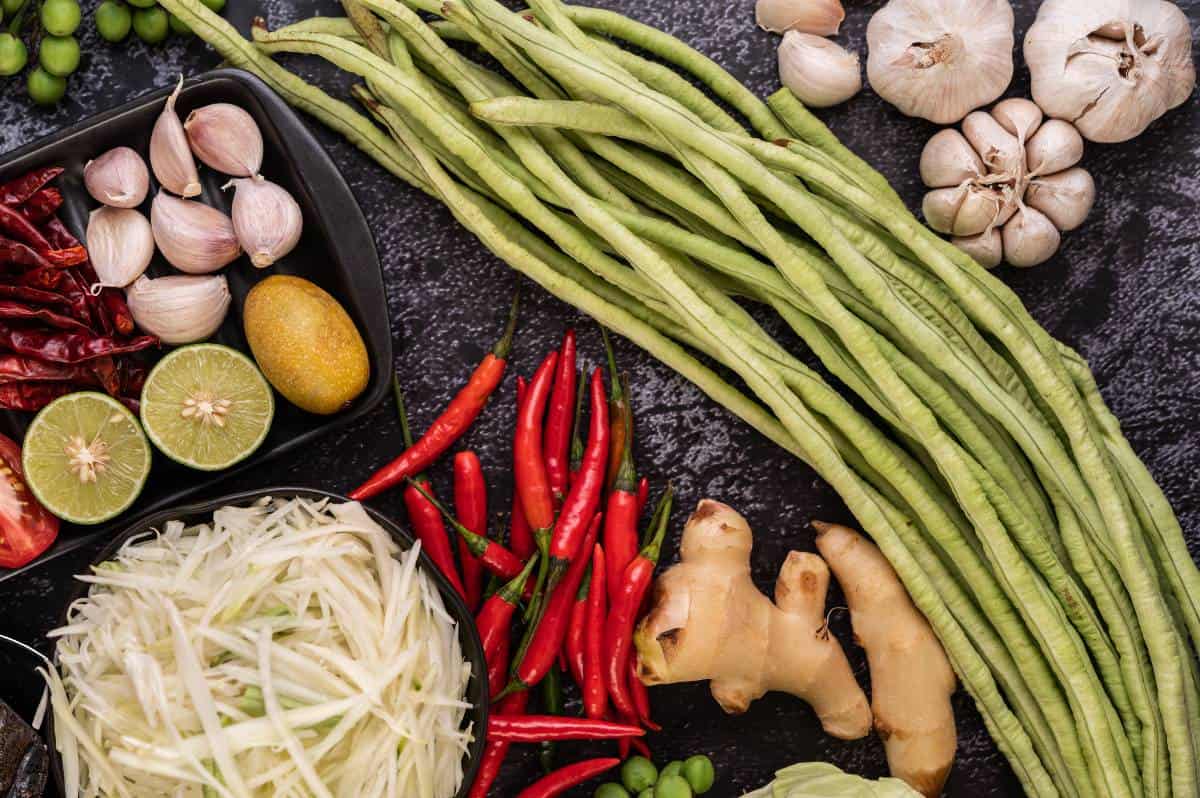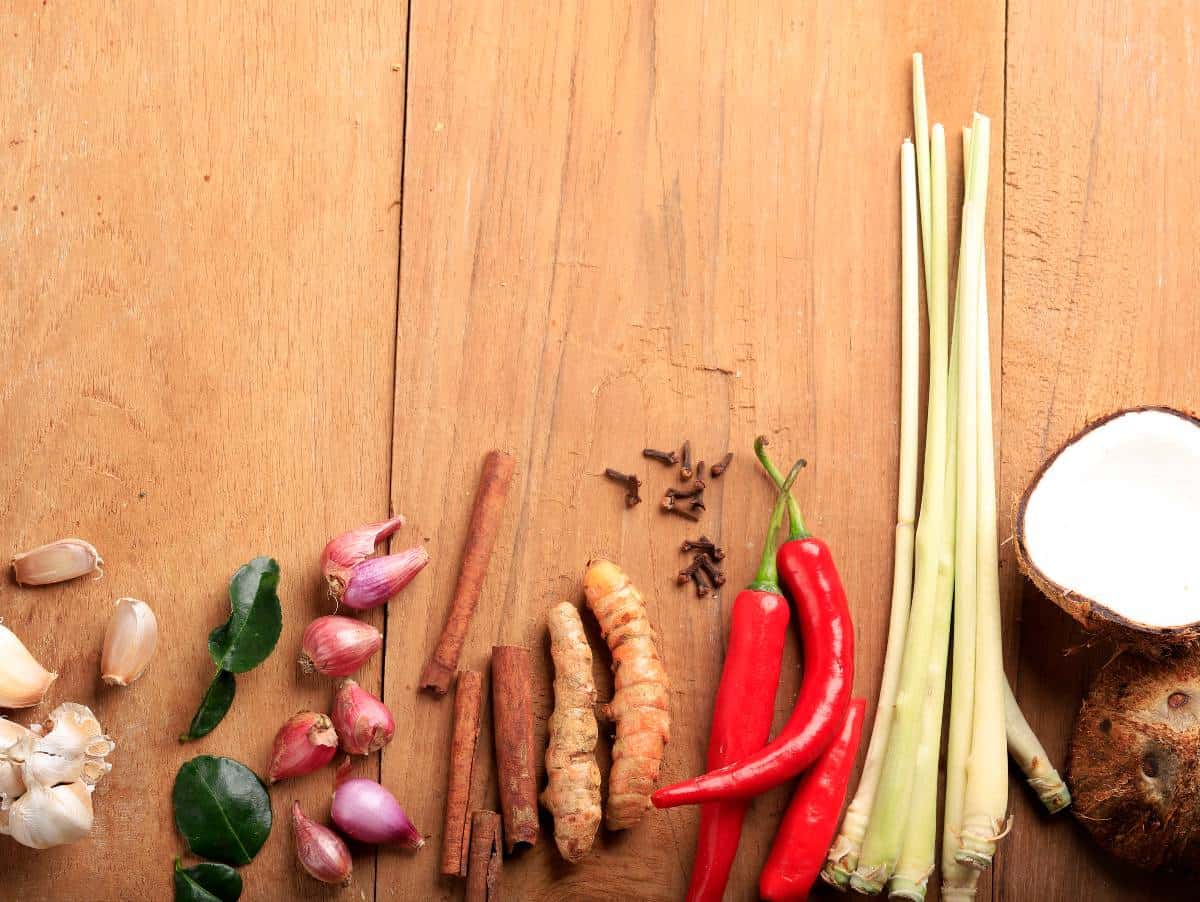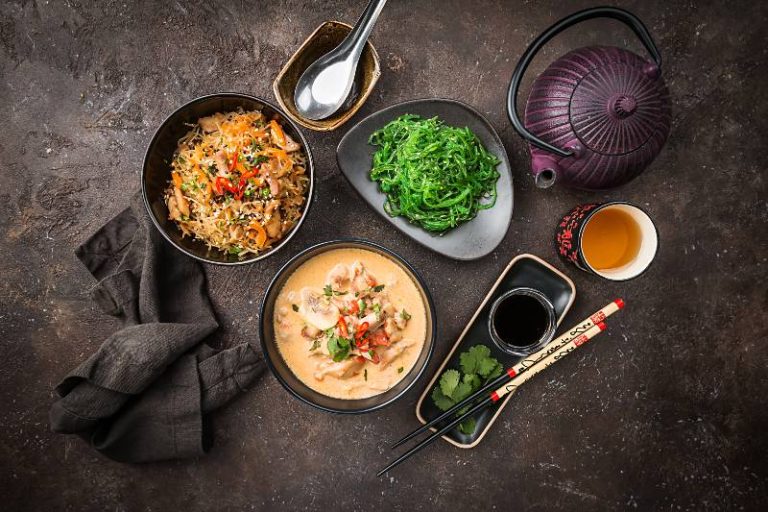What Are The Health Benefits Of Thai Ingredients?
Hey folks! Tom here, founder of BetterLivingAsia.com. Today I want to talk about one of my favorite parts of living in Thailand – the vibrant, flavorful ingredients used in Thai cooking and their extensive health benefits.
As someone who has struggled with joint issues and blood sugar regulation, I’ve been blown away by how much Thai food has improved my quality of life thanks to science-backed compounds in many staple ingredients.
Let’s explore some standouts.
Key Takeaways
- Thai cuisine boasts an array of herbs, spices, vegetables, and other ingredients with science-backed health benefits.
- Anti-inflammatory spices like turmeric, ginger, and galangal can help reduce joint pain and irritation.
- Herbs and veggies contain compounds that support immunity, heart health, blood sugar control, and more.
The Incredible Health Benefits of Thai Cuisine’s Flavorful Ingredients
Spices That Fight Inflammation
If you deal with bothersome aches and pains or conditions causing inflammation like arthritis, the anti-inflammatory properties in these Thai spices can help provide relief:
Turmeric
This vibrant yellow root is one of the most heavily researched spices. The curcumin compounds it contains are potent anti-inflammatory agents.
- Can aid joint and muscle soreness, arthritis, injuries, and gastrointestinal issues causing inflammation.
- Also boosts antioxidant capacity which supports overall health.
Ginger
Another anti-inflammatory staple, ginger adds a bright, zesty flavor to dishes.
- Contains gingerols that may reduce joint swelling and muscle soreness.
- Provides similar gastrointestinal relief as turmeric by lowering inflammation.
- Could help prevent certain cancers thanks to antioxidant gingerol compounds.
Galangal
Resembling its relative ginger, galangal has an intense, peppery flavor.
- Test-tube research indicates galangal extracts can reduce inflammation pathways.
- Also seems to offer pain-relieving effects, though more studies in humans are needed.
So if you add a daily serving of turmeric-, ginger- or galangal-laced Thai curry to your routine, over time you may notice less joint irritation which could lower reliance on medications.

Herbs and Vegetables That Boost Immunity
Alongside healing spices, Thai dishes incorporate fresh herbs and vegetables containing beneficial phytonutrients:
Lemongrass
A staple in soups and curries, lemongrass has research-backed Thai benefits:
- Provides antimicrobial effects against bacteria, fungi, and viruses.
- Aids digestion and gut health via prebiotics that feeds healthy gut flora.
- Clears up stomach woes like nausea, cramps, and indigestion.
Garlic
Pungent garlic bolsters immunity in multiple ways:
- Enhances immune cell function to ramp up infection-fighting response.
- Contains allicin, a compound with antiviral, antifungal, and antibacterial effects.
- Linked to slowed growth of certain cancers due to antioxidant properties.
Coriander
A quintessential ingredient in Thai cuisine, coriander:
- Has antioxidants that protect cells from DNA damage that causes cancer.
- Research indicates it can lower LDL cholesterol linked to heart disease.
- Provides an array of vitamins and minerals like vitamin C, magnesium, and iron.
Papaya
Green papaya salad is a quintessential Thai dish using unripe papaya containing inflammation-fighting lycopene:
- Its bright red pigment lycopene is a powerful antioxidant that may prevent certain cancers.
- Also aids skin health and protects against sun damage due to UV ray-fighting abilities.
Papaya salad is a win-win – a tasty low-calorie option that boosts immunity with cancer-fighting compounds!
Ingredients That Enhance Heart and Metabolic Health
Beyond immunity and inflammation support, numerous Thai ingredients promote cardiovascular and metabolic health:
Coconut Products
Coconut milk is a staple in Thai curries. The predominant saturated fats in coconut have been shown in research to:
- Raise HDL (good) cholesterol more than LDL (bad) cholesterol, reducing heart disease risk.
- Support fat burning for energy instead of glycogen from carbs, promoting weight loss.
- Provide MCTs that boost metabolism and satiate hunger hormones.
However, enjoyed in moderation since still high in calories – a good rule of thumb is sticking to a couple tablespoons of coconut milk per serving in dishes.
Tofu and Soy Products
Rich in compounds called isoflavones, tofu, and soy are Thai menu staples that may:
- Help balance female sex hormones during menopause to reduce hot flashes.
- Lower LDL cholesterol due to fiber and heart-healthy fat content.
- Decrease the risk of hormone-influenced cancers like breast and prostate cancer.
Basil
This flavor powerhouse contains essential oils called eugenols that studies indicate could:
- Lower blood pressure in people with hypertension.
- Improve cholesterol numbers by reducing LDL and raising HDL.
- Relax blood vessels similar to medications like aspirin.
Fish and Seafood
Lastly, the wide array of fish and shellfish dishes in Thai cuisine provide lean protein and inflammation-reducing omega-3 fatty acids that:
- Support brain health and may reduce age-related mental decline.
- Benefit heart wellness by lowering blood pressure and the risk of stroke.
- Help manage blood sugar regulation and reduce diabetes risk.
The variety of nutritious proteins makes it easy to rotate seafood meals for all these benefits!
Other Evidence-Backed Advantages
On top of the major benefits outlined already, Thai ingredients boost wellness in other ways through their:
- Digestion-aiding effects – Ingredients like lemongrass, ginger, and galangal ease nausea, stomach aches, bloating, and gas.
- Antimicrobial properties – Spices like garlic, chilies, and holy basil contain antiviral, antibacterial, and antifungal agents.
- Antioxidant capacity – Turmeric, garlic, chilies, papaya, and many herbs provide antioxidants that protect cells from damage linked to cancer, aging, and other conditions.
- Mental health protection – Compounds in basil and chili peppers may boost mood, focus, and mental alertness.

How Thai Cuisine Boosts Overall Well-being
When it comes to vibrant, nourishing foods that enhance total body health, Thai cuisine brings its A-game. The herbs, spices, veggies, and other staples used in Thai cooking offer a wide range of science-backed advantages – from fighting inflammation to supporting heart health, brain function, immunity, and beyond. By emphasizing fresh, nutrient-dense plant foods and lean proteins over processed ingredients, Thai food makes it easier to promote wellness. The flavorful dishes also make healthy eating enjoyable! When crafted properly, Thai meals help you feel energized, satisfied, and vibrant.
Understanding the Spicy Factor: Health Benefits of Thai Spice and Ginger
Thai food has a bit of a fiery reputation – and that heat offers some excellent health perks! Many Thai staples like fresh and dried chilies, garlic, galangal, and zesty ginger contain beneficial plant compounds that regulate inflammation pathways in your body. Consuming these pungent spices may help lower the risk of chronic inflammation involved in arthritis, gastrointestinal issues, heart disease, and even cancer development.
The spicy factor also seems to have metabolism-boosting effects to support healthy weight maintenance. So don’t be afraid to turn up the heat – those spices are brimming with compounds that fight inflammation and rev your calorie burning! Ginger also deserves a special shoutout for its medicinal superpowers including treating nausea, pain, migraines, and high blood pressure.
Examining the Role of Thai Ingredients in Boosting Vitamin and Mineral Intake
One reason Thai cuisine is so healthy is that various ingredients deliver a spectrum of vitamins, minerals, and other nutrients vital to whole-body wellness. For example, fresh Thai basil bursts with vitamin K, iron, and calcium; chili peppers provide metabolism-enhancing vitamin B6; garlic and ginger contain immunity-enhancing vitamin C.
Together they help you meet daily nutrition needs for optimal function. Thai meals also often emphasize non-starchy veggies like bok choy, bean sprouts, peppers, and greens that have very few calories yet give you filling fiber, antioxidant plant chemicals, blood sugar-regulating minerals like magnesium and chromium, plus more. Protein sources like tofu or eggs lend staying power. A Thai-style stir fry essentially hands you a nutrient biochemical powerhouse in one dish!
Thai Ingredients and Their Contribution to Healthy Digestion
With its focus on fresh, potent seasonings, Thai food brings major digestive health advantages to the table. Ingredients like turmeric, garlic, chili, lemongrass, ginger, and galangal have antioxidant and anti-inflammatory compounds shown to ease bloating, stomach pains, cramps, nausea, and other tummy troubles.
They relax GI muscles and help food move smoothly through your system. Additionally, fermented staples like miso, kimchi, coconut vinegar, and pepper pastes contain probiotics for healthy gut flora balance warding off issues like diarrhea. Eating Thai foods regularly may help heal and strengthen your digestive tract. Be sure to pair notoriously irritating ingredients like chilies or garlic with rice and cooling cucumber raita to prevent discomfort.
Exploring the Role of Thai Ingredients in Reducing Inflammation
As mentioned regarding spicy seasonings, Thai staples like ginger, turmeric, and galangal abound with anti-inflammatory properties that science indicates can ease joint swelling and arthritis irritation. Compounds in these rhizomes provide pain relief comparable to OTC meds for some individuals.
Chili-derived capsaicin also seems to have inflammation-lowering effects. Beyond spices, fruits like papaya and veggies like tomatoes contain antioxidants that dampen widespread inflammation involved in nearly every chronic disease.
How Traditional Thai Dishes Promote Heart Health
From fresh herbs to fabulous seafood, numerous Thai cuisine components support a healthy ticker. For example, the essential oil eugenol found in abundance in Thai basil boasts blood vessel-relaxing abilities similar to pharmaceutical interventions. Garlic, lemongrass, and chilies tout compounds that benefit cholesterol ratios for lower stroke and heart attack risk. Omega-3-rich oily fish common in Thai cooking aid hypertension and circulation too.
When you focus on traditionally prepared stir-fries, steamy curries, and vibrant veggie sides instead of oily, sugary Bastardized Westernized versions, Thai food delivers a trifecta protective punch against America’s #1 killer. Be sure to watch sodium from soy/fish sauces and balance meat with plant foods.
Choosing the Healthiest Thai Dishes
Thai cuisine offers a flavorful array of healthy ingredients. However, some restaurant dishes or preparation methods are better than others:
What to Look For
- Plant-based proteins – Tofu, beans, nuts, eggs. Lean meats like chicken or fish sparingly.
- Veggie-centric – Mainly non-starchy veggies – peppers, greens, tomatoes etc.
- Herb/spice-focused – Turmeric, lemongrass, galangal, basil.
- Grilled/steamed/stir-fried – Minimal breading or frying.
Healthy Menu Options
- Papaya salad
- Tom yum soup
- Veggie-heavy curries
- Larb (ground meat salad)
- Stir-fried veggies/tofu/chicken
Caution with:
- Fried appetizers – Fresh rolls, spring rolls, samosa, etc.
- Noodle/rice-based – Pad Thai, fried rice.
- Creamy curries – Massaman, panang, khao soi curries.
- Sugary drinks – Thai iced tea/coffee with sweetened condensed milk.
To keep Thai food healthy, emphasize veggie-centric dishes focused on fresh herbs/spices while limiting fried, carb-heavy, or sugary menu items.
FAQs
Which ingredients best reduce inflammation?
Turmeric, ginger, galangal, lemongrass, and chili peppers all contain potent anti-inflammatory compounds.
What vegetables boost immunity?
Onions, garlic, mushrooms, and papaya (rich in lycopene and vitamin C) improve immune defense.
How does Thai basil enhance health?
Thai basil contains essential oils that improve blood pressure, cholesterol levels, blood flow, and mental function.
Why is Thai food often healthier than Western diets?
It emphasizes fresh herbs, spices, vegetables, and lean proteins vs processed carbs, sugars, and unhealthy fats.
Which Thai dishes should I pick to stay healthy?
Focus on grilled/steamed veggie-based curries, stir-fries, soups, and salads vs fried, creamy or carb-heavy dishes.
Conclusion
As you can see, myriad Thai ingredients like turmeric, basil, garlic, lemongrass, chilies, papaya, seafood, and more provide science-backed wellness benefits – from fighting inflammation to boosting immunity and enhancing heart, brain, and metabolic health.
By being mindful of preparation methods and balancing veggie/herb-focused dishes with protein sources like tofu or fish, it’s easy to incorporate this flavorful cuisine into a healthy lifestyle. Personally, eating Thai staples has made a world of difference in my inflammation levels and blood sugar regulation.
I hope these tips give you a helpful overview of transforming your health with the incredible ingredients used in Thai cooking! Feel free to reach out if you need any advice on putting together nutrition-focused Thai meals or want to learn more about savoring the benefits of Thai cuisine.






